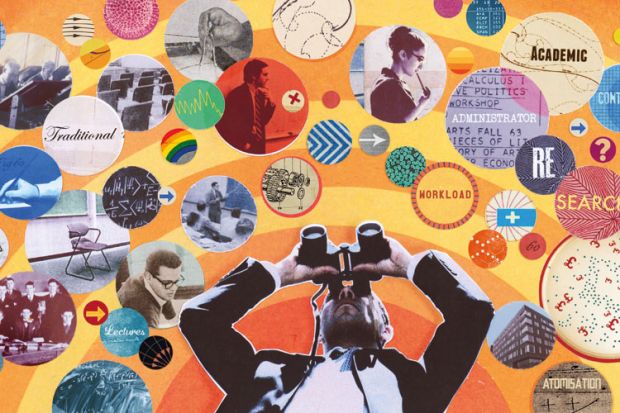The word “traditional” is possibly the most overused term in higher education. In fact, in common with nearly all institutions that have endured for any substantial length of time, the university has been adroit at reinventing itself. The latest reimagining is that “traditional” universities are research-led institutions. This myth has comparatively recent roots.
An insight into just how much priorities have changed among academics during the recent past is provided by The British Academics, A. H. Halsey and M. A. Trow’s seminal study of a still-small and elite UK higher education sector, published in 1971 and drawing on data gathered in the mid-1960s. The authors found that British academics were overwhelmingly oriented towards teaching rather than research. A mere 10 per cent were even “interested” in research, while just 4 per cent of them regarded research as their primary responsibility. The study concludes that “elitist teachers”, predominantly interested in teaching rather than research and opposed to the expansion of the system, constituted the dominant “academic type”. Nor was it just UK academics who saw their role as primarily about teaching. Writing about US academics as late as 1979, Logan Wilson asserted that even though “assigned teaching loads…normally allow ample time for research, the majority consider teaching to be more important than research”.
As the Society for Research into Higher Education celebrates its 50th anniversary this week, I have been looking back at early issues of Studies in Higher Education, the journal of the SRHE, first published in 1976. Unsurprisingly, many articles focused on undergraduate teaching, picking over very practical issues such as the use of lectures, examinations and various forms of educational innovation. The language of this time was all about “university teachers”. The virtual disappearance of this phrase in the modern lexicon tells us a lot about the way in which the subsequent separation of government funding for research and teaching has led to a radical shifting of academic priorities.
Analysis of the academic profession in the 1970s, in the aftermath of the campus radicalism of the previous decade, was sometimes characterised in terms of a division between the forces of conservatism and liberalism or in attitudes towards the expansion of higher education. Today, sadly, the very idea that the sociopolitical views of academics should be sought, let alone listened to, might seem at best quaint or at worst, irrelevant. This is partly about the way in which the public role and status of the academic has shrunk. The divisions today within the academic profession are more usually expressed in terms of contractual or stratified status: research or teaching contracts, tenured or untenured, full- or part-time, and the career critical division between those who have been submitted or omitted for national research audit exercises. The expansion of higher education has not only led to increased inequality between students in a highly stratified sector – it has had much the same effect for academics. The realities of casualisation and the pressures of performativity have shaped a more inward-looking “academic profession”.
This inward turn marks not just the declining role of academics as public intellectuals but also the atomisation of academic practice and identity. Work has been parcelled into discrete and specialised niches. Only around half of academics in the UK or Australia are now on “all round” contracts involving teaching, research and service. The other half are a disparate collection of para-professionals who might research or teach or, perhaps, manage. The line between an “academic” and an “administrator” is also becoming fuzzier as a result of this fragmentary process.
Some of the early articles published in Studies in Higher Education essentially constituted personal reflections, part of a lost world of scholarly dialogue about academic identity. In “Reflections on working in a university”, Adam Curle, the first professor of peace studies at the University of Bradford, made no mention of phrases or agendas that might predominate if such a piece were to be penned today, such as “workload” or “research grant”. Instead, he provided a critical reflection on his own development from “middle class English academic, subtly conscious of status, class, and colour, believing – albeit criticizing – the values of western civilization” to a later realisation that his “attitude toward students had the same ominiscient superiority that had tainted my attitude towards people in the countries where I had worked on development problems”. Such a candid self-analysis is all too rare today as modern para-professionals, including full professors, scurry around meeting the demands of a performative culture.
Today Curle’s idiosyncratic meanderings would probably face instant rejection from Studies in Higher Education given its lack of a “methodology” section, empirical evidence or other sufficiently respectable social scientific clothing. Such conventions now predominate and have positively contributed to achieving the hope expressed by Tony Becher, in his opening editorial in the first issue of Studies in Higher Education in 1976, for higher education to “constitute as valid a field of intellectual enquiry as can any specialized discipline”. Yet much of the scholarly dialogue from the 1970s and early 1980s reminds us of what has been lost. These authors addressed a key question too rarely considered today: what does it mean to be an academic?
Bruce Macfarlane is professor of higher education at the University of Southampton. The Society for Research into Higher Education is celebrating its 50th anniversary this week with a colloquium and reception at the House of Lords on 26 June.
POSTSCRIPT:
Article originally published as: Look back in wonder: the invention of academic ‘tradition’ (25 June 2015)
Register to continue
Why register?
- Registration is free and only takes a moment
- Once registered, you can read 3 articles a month
- Sign up for our newsletter
Subscribe
Or subscribe for unlimited access to:
- Unlimited access to news, views, insights & reviews
- Digital editions
- Digital access to THE’s university and college rankings analysis
Already registered or a current subscriber? Login




